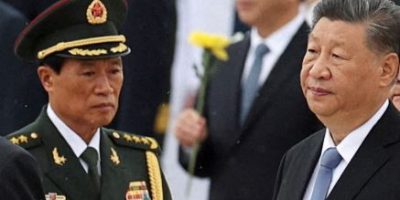Unrest tests Hong Kong’s political ties with Beijing

A bastion of civil liberties faces a reckoning with China’s authoritarianism
As antigovernment demonstrations escalate in Hong Kong, each side is staking out an increasingly polarized position, making it difficult to find a path to compromise between the protesters and China’s ruling Communist Party.
LAM YIK FEI FOR THE NEW YORK TIMES
A demonstration in Hong Kong last month. “I know I’m risking my life,” one protester said this week. “But I’ve thrown caution to the winds.”
The demonstrations, which began as a fight against a bill that would have allowed Hong Kong residents to be extradited to the mainland, have broadened into a call for free elections, which largely do not exist in China. To Beijing, it would be a direct challenge to the leadership, tantamount to losing control of Hong Kong.
The once peaceful demonstrations have now intensified, coming into conflict with Hong Kong’s reputation for order and efficiency.
China is also projecting more power, raising the possibility of more intense and more frequent clashes with the police. An official in Beijing on Monday condemned the actions of the protesters last weekend, casting them as the first signs of “terrorism.” The Chinese police also appeared to conduct large-scale exercises across the border from Hong Kong in the mainland city of Shenzhen.
On Tuesday, activists staged a fifth straight day of protest at the airport, crippling one of the world’s busiest transportation hubs with hundreds of cancellations. Medical professionals also held rallies at local hospitals over what they said was an escalation in the intensity of police violence.
In a news conference with combative reporters on Tuesday, Hong Kong’s leader, Carrie Lam, pleaded for calm and said that “the stability and well-being of seven million people are in jeopardy.” The city’s main stock index fell 2 percent Tuesday, and has declined 11 percent over the past month.
“We are at a crossroads,” said Martin Lee, a democracy advocate and former Hong Kong lawmaker. “The future of Hong Kong — the future of democracy — depends on what’s going to happen in the next few months.”
The unrest is exposing the conflict in the political experiment that began when China reclaimed Hong Kong from Britain in 1997, an ambitious attempt to marry Beijing’s brand of authoritarianism with a bastion of civil liberties.
China’s top leader, Xi Jinping, wants to make Hong Kong more like a mainland city, using economic incentives to buy happiness and propaganda to win loyalty. The protesters, who represent a wide swath of Hong Kong, want a government that looks out for their inter ests, not just Beijing’s, to help resolve problems like astronomical housing prices and low wages.
The two sides no longer seem to recognize each other’s concerns.
The protesters recently adopted a slogan with pro-independence roots: “Liberate Hong Kong, revolution of our times.” Many say they use it to describe their desire for a political voice. But Beijing has held up the slogan as evidence that the protesters support independence.
The differences started to widen when Mrs. Lam pushed ahead with an unpopular extradition bill, despite a huge rally in early June that drew one million people. To many protesters, her decision drove home the fundamental shortcomings of a leader who is accountable to Beijing.
Mrs. Lam later suspended the bill but stopped short of withdrawing it.
“They kind of try to rule Hong Kong the way they rule China. That doesn’t really work in an open society,” said Michael C. Davis, a global fellow at the Wilson Center, a think tank in Washington. “In Hong Kong, when you push people, when you repress them, when you ignore them — they push back.”
The Communist Party is determined to not look weak in the face of the tumult, which has quickly become the biggest public resistance to the rule of Mr. Xi since he took power in 2012. The Chinese government has made veiled threats of military intervention and accused protesters of plotting a “color revolution” with help from the United States, referring to anti-Communist uprisings it says are orchestrated by the West.
“It is now a life-or-death fight for the very future of Hong Kong,” Wang Zhimin, the head of the central government’s office in the city, warned members of Hong Kong’s establishment last week. “There is no room for retreat.”
“PEACEFUL PROTESTS ARE NO USE”
Crystal Yip, a 20-year-old university student, sat peacefully among the demonstrators at the airport on Monday, which prompted the cancellation of more than 150 flights. She is usually at the front lines of street clashes with the police, snuffing out tear gas canisters, building barricades and providing cover to protesters who hurl bricks.
Millions of people — teachers, construction workers, lawyers, students, and even civil servants — have filled the streets of Hong Kong to demonstrate against the government in a largely peaceful manner. But a small group of young, confrontational protesters like Ms. Yip is using forceful tactics to get a message across to Beijing.
“I know I’m risking my life,” Ms. Yip said. “But I’ve thrown caution to the winds.”
During pro-democracy protests in 2014, Ms. Yip, then a high school student, hovered on the edge of rallies, terrified of standing up to the authorities. But her attitude recently shifted after watching documentaries about the antiRussian protests in Ukraine in 2014.
“Peaceful protests are no use,” Ms. Yip said. “If violent resistance can work, then why not use it?”
Ms. Yip and others have embraced more extreme tactics after the failure of Hong Kong’s previous political movements, including the Umbrella Revolution of 2014, to deliver free elections. Their anger has grown as the government has encroached further, removing several pro-democracy lawmakers from office and sentencing protesters to long jail terms.
In that time, Hong Kong’s problems — vast income inequality, a shortage of affordable housing, a dearth of high-paying jobs — have only seemed to worsen.
“I felt so sorry about how we, the Hong Kong people, have been treated,” said Charlie Li, a construction mechanic who was inspired by the persistence of other protesters.
Mr. Li, 35, says he has thrown umbrellas and helmets at police officers. He blames the mainland government for driving protesters toward violence. “They don’t listen to us at all,” Mr. Li said.
The movement reached a turning point in July, when a small group of activists stormed the Legislature, smashing glass walls and spray-painting slogans. Since then, the protesters’ list of demands has expanded to include free elections.
Under the current system, a committee of about 1,200 residents, dominated by Beijing’s allies, selects the leader. A small minority of protesters have openly called for Hong Kong’s independence, but most complain of feeling politically powerless.
As China takes a harder line, Hong Kong’s veteran pro-democracy politicians also face a dilemma.
The protests have helped reinvigorate their agenda. But by continuing to support the younger demonstrators’ more extreme tactics, the camp risks endangering the activists and increasing the chances of repression. More than 700 people have been arrested already, some 150 people last weekend alone.
“The Communist Party does not forget, and it does not forgive,” said Steve Tsang, director of the SOAS China Institute in London. “The more successful they are, the more the Chinese government and Xi Jinping feel embarrassed, the higher the price will be.”
FEARS OF A “COLOR REVOLUTION”
On the mainland, pundits have warned that Hong Kong is on the brink of disaster. State-run newspapers have called on the public to help protect China’s sovereignty. Prominent officials have blamed American diplomats for working as “black hands” intent on fomenting an uprising.
Beijing once worked diligently to keep word of the Hong Kong protests from reaching the mainland, perhaps fearing the unrest could spread.
But in recent days, Mr. Xi’s government has led an all-out effort to discredit the protesters.
The sudden shift reflects deepening concern within the party that it is facing a secessionist threat that could undermine Mr. Xi’s hard-line image.
The situation poses a delicate challenge. Mr. Xi, who has led a broad crackdown on dissent, does not want to be perceived as yielding to the party’s foes. Yet he is likely wary of taking drastic action, such as deploying troops, for fear of a broader fallout.
Hong Kong has long served as China’s entree into the global financial system and a symbol of the Communist Party’s ability to work with free-market societies; an overreaction might alienate big companies and imperil the territory’s economy.
“Anything too dramatic is going to be quite a high cost. It will be called Tiananmen 2.0, and they don’t want that kind of reputational hit,” said Kerry Brown, a professor of Chinese politics at King’s College London, referring to Beijing’s bloody crackdown on protesters near Tiananmen Square in 1989.
For the moment, Mr. Xi’s strategy appears to be to throw the government’s support behind Mrs. Lam and the police while blaming the United States for sowing strife.
Inside a ballroom at the Wuzhou Guest House in southern China last week, Zhang Xiaoming, Beijing’s top official for Hong Kong, told an audience of 500 politicians and business executives from Hong Kong that the protests “have the clear characteristics of a color revolution.”
In a smaller meeting after the remarks, Michael Tien, a pro-establishment lawmaker from Hong Kong concerned by the escalating violence, said he confronted mainland officials. He urged them to consider giving in to some of the protesters’ demands, including the withdrawal of the extradition bill. “We must resolve these issues,” Mr. Tien said he told Mr. Zhang at the meeting, which took place in Shenzhen. Mr. Tien said Mr. Zhang smiled and took a lot of notes but didn’t comment on his proposals.
Mr. Zhang also rejected the protesters’ demands for free elections, saying the Chinese government would not be willing to consider any electoral system that does not allow Beijing to screen a list of candidates, according to Mr. Tien.
Anything short of that, Mr. Zhang said, would be as good as giving up control of Hong Kong.
“I just want the central government to be more concerned about how these future generations will think, beyond the current unrest,” said Mr. Tien.
The debate focuses now on whether the “one country, two systems” arrangement can survive in Hong Kong, or whether Beijing will seek to make it “one country, one system.”
Ronny Tong, a pro-establishment member of the executive council, Mrs. Lam’s top advisory body, said he worries that Hong Kong risks losing its special status.
“How do you think Beijing will think now?” he added. “Do you think they will want to give democracy to people when people are insulting their rule?”
COURTESY NEW YORK TIMES
Related News

More than 3,000 migrants died while trying to reach Spain
DNA MADRID: More than 3,000 migrants died while trying to reach Spain this year, aRead More

Chinese Communist Party expels top generals
News Desk BEIJING: The Chinese Communist Party has expelled nine top generals in one ofRead More


Comments are Closed